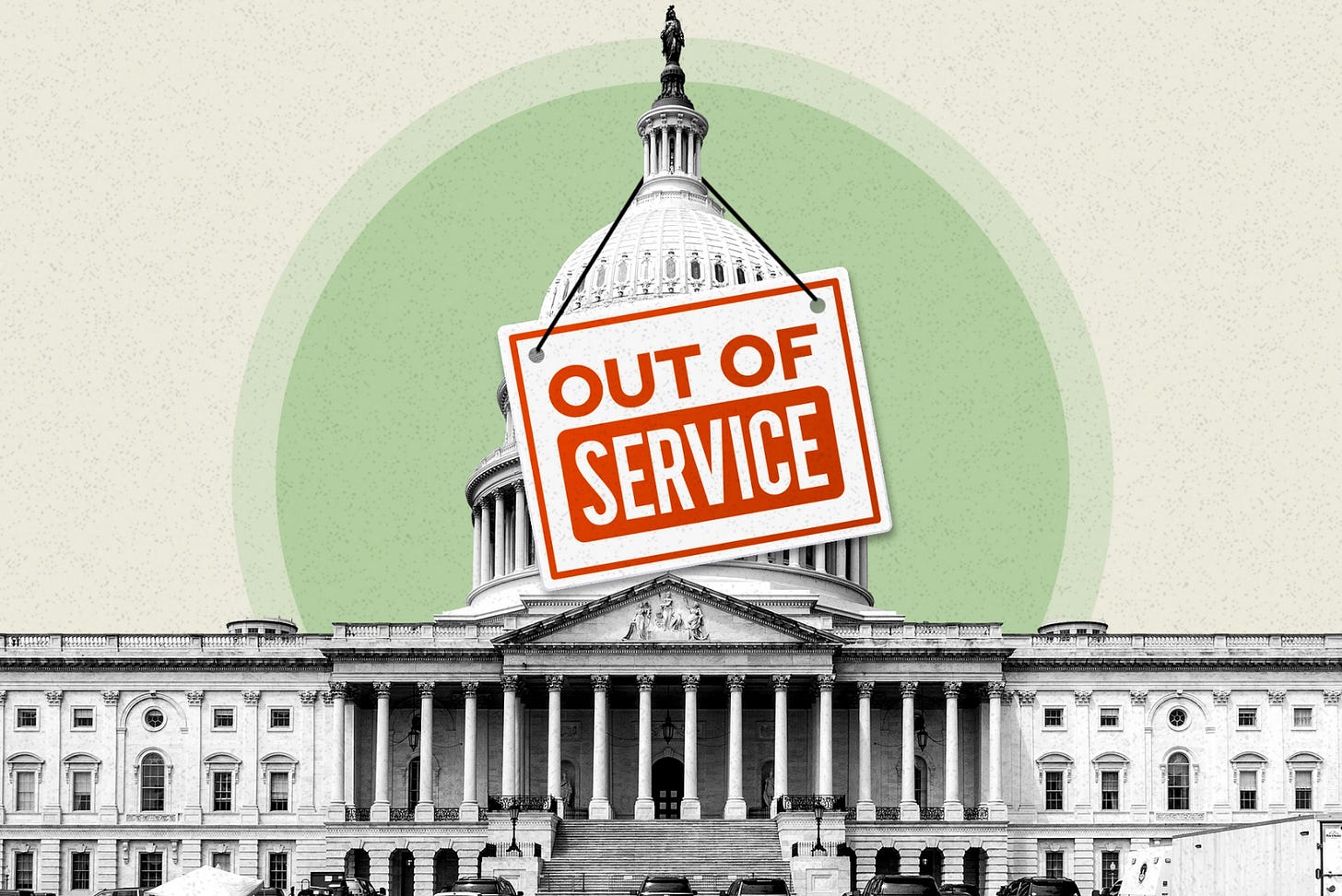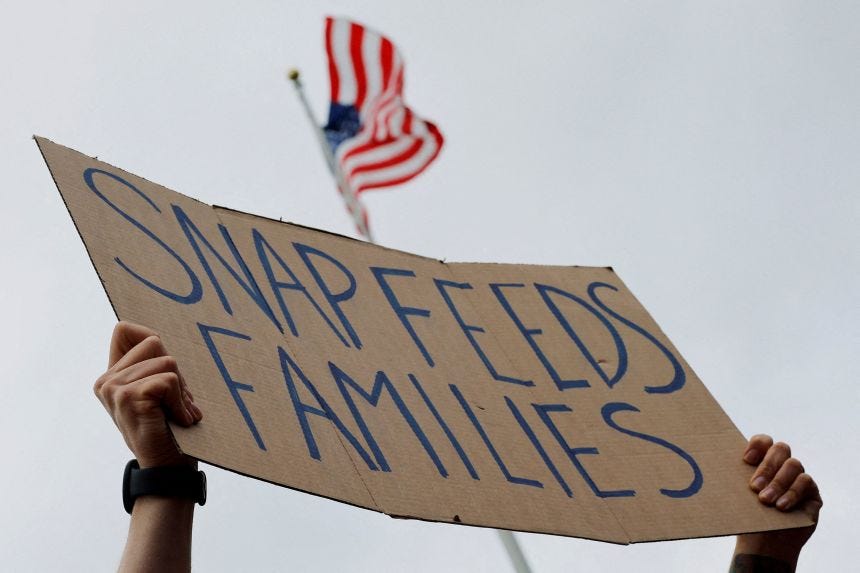The Day EBT Went Dark
SNAP funding runs out as the shutdown hits home for millions of Americans.
As of today, SNAP and EBT funding has run out. The U.S. Department of Agriculture warned that it could happen if the shutdown dragged on, and now it has. Millions of Americans who depend on monthly benefits are stuck in limbo while Washington continues to argue over spending bills and continuing resolutions.
During the most recent shutdown in 2018-2019, contingency funds kept SNAP payments going. This time, there was nothing left to tap. And today marks the first lapse in benefits in the program’s six-decade history.
The USDA still holds roughly $5 billion to $6 billion in contingency funds, but it says it can’t legally use that money to cover regular benefits. In a memo from Oct. 24, 2025, the department wrote:
“SNAP contingency funds are only available to supplement regular monthly benefits when amounts have been appropriated for, but are insufficient to cover, benefits. The contingency fund is not available to support FY 2026 regular benefits, because the appropriation for regular benefits no longer exists.”
This distinction matters because even if the USDA could access the fund, it wouldn’t nearly be enough. The fund is $3 billion less than the roughly $9 billion required to cover a full month of benefits.
Earlier this fall, the agency briefly suggested the money could be used to keep benefits funded during a lapse, noting that “these multi-year contingency funds are also available to fund participant benefits in the event that a lapse occurs in the middle of the fiscal year.”
That language was later removed from its official shutdown plan.
Now, states and food banks are left scrambling to fill the gap. There’s no reimbursement process in place for states that might try to cover the cost on their own.
The USDA memo explicitly stated:
“There is no provision or allowance under current law for States to cover the cost of benefits and be reimbursed.”
After I posted about writing this story, I started hearing from people directly affected.
One woman told me her father is losing his SNAP benefits. He’s been too sick to work while undergoing cancer treatment and has been calling the Department of Children and Families to figure out what happens next. She said he’s been stretching what little money he gets from the state, searching for cheaper food, but it still isn’t enough to cover rent, bills or groceries.
Another person who reached out said she’s homeless but working full time, living in a hotel, and using EBT to cover food so she can keep one expense off her paycheck. Since the shutdown began, she’s been trying to save what she can, but as she put it, “it’s hard to save when you live in a hotel, pay to get to work and back, and still need to buy food for a week or two.” She told me she also has a one-year-old and helps feed her younger siblings when her mom, who’s recovering from a work injury, can’t.
These two stories show how quickly a political debate turns personal. For people already juggling rent, work, and food, there’s nothing left to fall back on when the safety net gives out.
By the end of the week, the fight over food aid had reached the courts.
On Thursday, a federal judge in Boston, Indira Talwani, signaled she might intervene after questioning the Trump administration’s refusal to use emergency funds for SNAP. Less than 24 hours later, her skepticism turned into action and joined by a second ruling hundreds of miles away.
In Rhode Island, Judge John J. McConnell ordered the administration to tap the USDA’s contingency fund and continue paying food stamp benefits during the shutdown, saying the government “must distribute the contingency money timely, or as soon as possible, for the Nov. 1 payments to be made.” Talwani issued her own order soon after, requiring the administration to explain by Monday how it would fund benefits for November.
Late Friday night, President Trump said on social media that his administration would provide the payments “once a federal court can clarify how we can legally supply the money,” but warned delays were still inevitable.
“It is already delayed enough due to the Democrats keeping the government closed through the monthly payment date,” he wrote, “and, even if we get immediate guidance, it will unfortunately be delayed while states get the money out.”
Even with the rulings, uncertainty remains. State officials say they have yet to receive instructions or funds, and advocates warn that millions of Americans could still face interruptions or reduced benefits in the days ahead.
“It does seem to me really clear what Congress was trying to do,” Talwani said. “What Congress was trying to do is protect the American people.”
She added bluntly:
“We’re not going to make everyone drop dead.”
Lawmakers are already trying to frame the story. Republicans are calling it fiscal responsibility. Democrats are calling it neglect. Both sides have talking points ready, but the reality looks different outside the Capitol. For people waiting on benefits that never came, the spin doesn’t matter.
A shutdown sounds like an abstract idea until it reaches the point where people feel it. The arguments in Washington always end the same way: someone at home trying to figure out how to make it work.
The longer this goes on, the harder it is to separate politics from daily life. Programs like SNAP are not theoretical. They are how millions of families buy groceries. When that disappears overnight, it doesn’t feel like a budget fight. To some, it screams instability.
Shutdowns are supposed to be leverage. They are meant to force a deal. But this one has done what they all eventually do — made regular Americans collateral in a fight they didn’t start.
The USDA can issue memos, and Congress can trade statements, but the reality is simple. The system broke, and the people depending on it were the first to notice.
What’s happening with SNAP is bigger than one agency or one program. It’s about how fragile everyday life becomes when government stops working the way it’s supposed to.
For the families I spoke with, this isn’t politics. It’s survival.



